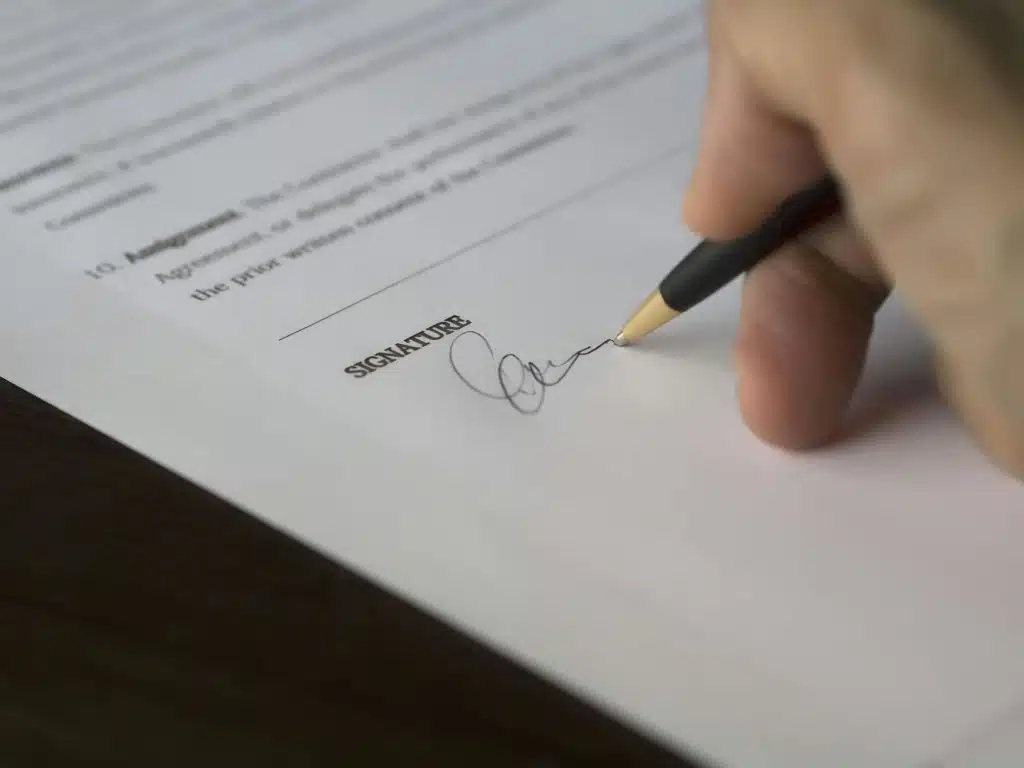Introduction
While using the correct name in a contract may seem like a minor issue, it is actually incredibly important. For a contract to be legally binding and enforceable, you must be entering into an agreement with a legal entity or a legal person.
Using the wrong name can lead to disputes, delays, or even voiding the contract. If the name is incorrect, you may not be able to pursue the party for a breach of contract, undermining a key benefit of having a contract.
In addition to ensuring the correct name of the person or entity, you should also confirm that the party you are dealing with has the authority to enter into the contract on behalf of that entity.
Below are some tips on how to ensure you use the correct name on your contracts and why it is important.

Business Names
One of the most common issues that arise here is simply using a party’s business name in a contract. This is a problem as business names are not a legal entity capable of entering into a contract and as such any contract signed using a business name is not legally binding or enforceable. For example, a contracting party should be listed as ABC Pty Ltd trading as CDE Business.
This is incredibly important to consider as many entities use a business name when operating that is not the same as their legal name.

The Correct Entity
When entering into a contract with another party, you should ensure that you are entering into a contract with a legal entity or legal person. A legal entity or person is someone that can be pursued under the law. Examples of legal entities and legal persons include:
- Individuals;
- Companies;
- Trusts; and
- Partnerships.
Individuals
Individuals are legal persons who can enter into a contract. To ensure that you are using the correct name, you must use an individual’s legal name. Another good practice is to include their residential address.
Companies
Companies are legal entities that are capable of entering into contracts. When using a company name in a contract, we also recommend including the relevant ABN (Australian Business Number) or ACN (Australian Company Number) as well as the company’s registered address. It is also good practice to conduct an ABN search to ensure the name is spelled correctly in the contract.
Trusts
Trusts are not legal entities that can enter into a contract. However, trusts are managed by trustees who are able to enter into a contract. Trustees can either be a company or an individual, and they are the party that must be listed in the contract. For example, a contracting party should be listed as ABC Pty Ltd as trustee for CDE Trust. If you only list a trust and not the trustee as the contracting party, the contract is likely to be found void as a trust is not a legal entity.
Partnerships
Unlike individuals and companies, a partnership is not a legal entity. When dealing with a partnership, each separate partner would need to be a party to the contract. Similar to individuals, partners should be named in a contract using their full legal name and their residential address.
In some cases, such as where there are a large number of partners in a partnership, it may be impractical to name each partner. However, the very nature of a partnership means that each partner is treated as an agent of the partnership and can enter into a contract on behalf of the partnership. Despite this, we recommend that where possible all partners be listed in a contract.
It is also not unusual for partnerships to have a nominee company that is controlled or owned by the partners. The purpose of this nominee company is to enter into contracts on behalf of the partnership, in which case the same details required for a company should be included in the contract.

Contracting with the Right Party
Beyond confirming that the entity is legally capable of contracting, it is crucial to ensure that you are dealing with the correct and intended party. Contracting with the wrong party can have serious implications, such as being unable to pursue them for a breach of contract.
To safeguard against potential errors, we recommend:
- Gathering information from the relevant party such as their full name, address and their ABN;
- Conducting research, such as an ABN search or a company search; and
- Verifying that the individual signing the contract is authorised to act on behalf of the entity, including ensuring that directors or authorised representatives are signing where applicable.

Conclusion
Whether you are drafting, reviewing or signing a contract, getting the contracting party’s name right is crucial in order to protect your interests and ensure the legality and enforceability of a contract.
The information in this article is for general purposes only and you should obtain professional advice relevant to your specific circumstances.
Get in touch
If you or someone you know wants more information or needs help or advice, please contact us.
Related Resources
Contracts Dispute Resolution & Litigation
What happens when a contract is breached?
Contracts are the most common tool used throughout our lives to create legal relationships between parties. Most importantly, in creating a contract parties are able to define what actions people will be able to take when a contract is breached.. If you have entered a contract with another party, you...
Read moreContracts Regulatory and Compliance
Unfair Contracts Update – are you complying with the law
Unfair Contracts Update – are you complying with the law The Unfair Contract Terms Regime (UCT Regime) was extended to cover standard form contracts entered into with ‘small business’ in November 2016. The Regime is fully operational and has a significant impact on the way Australian businesses contract with each...
Read more



